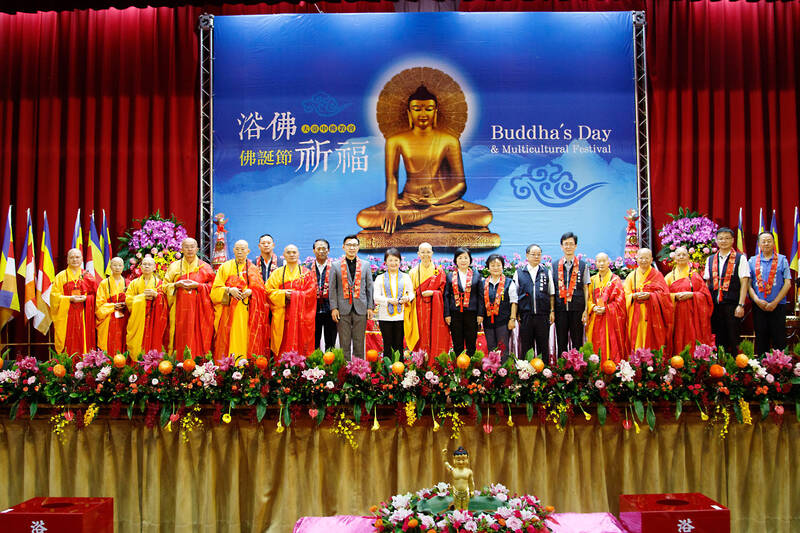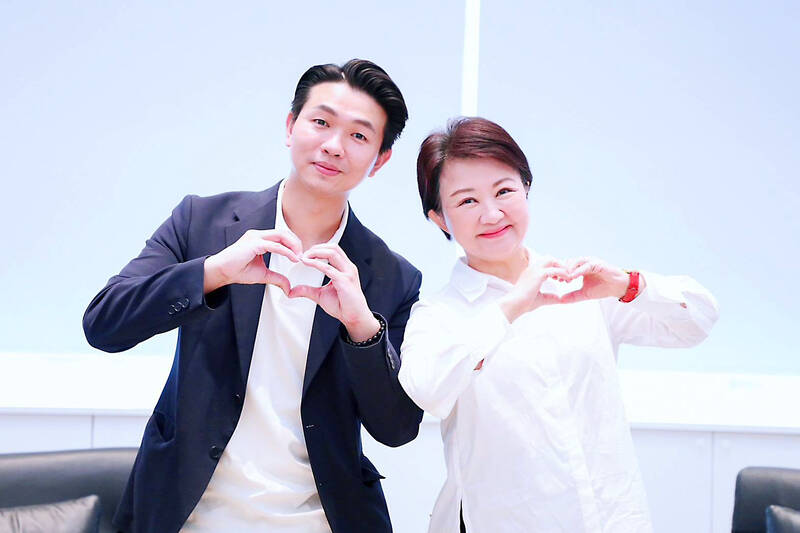Two moves show Taichung Mayor Lu Shiow-yen (盧秀燕) is gunning for Chinese Nationalist Party (KMT) party chair and the 2028 presidential election. Technically, these are not yet “officially” official, but by the rules of Taiwan politics, she is now on the dance floor.
Earlier this month Lu confirmed in an interview in Japan’s Nikkei that she was considering running for KMT chair. This is not new news, but according to reports from her camp she previously was still considering the case for and against running.
By choosing a respected, international news outlet, she declared it to the world. While the outside world likely paid little attention, domestically the message was unmistakable: She is moving on to a larger stage.

Photo: Chen Chih-chu, Liberty Times
Part of the dance is to leave options open before formally committing, and with the chair race due in late September, she has time. If something goes wrong in the meantime, or if power brokers in the party offer her a deal that provides more benefits than taking on the role of chair, she can pivot accordingly.
Earlier this year, I suggested that strategically, she would be better off concentrating on her job as Taichung mayor until she is term-limited out of office in December next year. Taichung mayor is obviously a full-time job, and concurrently running the Taipei-headquartered party runs the risk of doing one or both jobs poorly and making mistakes that could imperil her shot at the presidency in 2028.
The situation has changed. Current KMT Chairman Eric Chu (朱立倫), knowing he is likely to face challengers of a higher caliber than the three relative nobodies already declared, has gone all in on appealing to the base. The base is more likely to turn out to vote in the chair election, so this makes some strategic sense in the short term.

Photo: Chang Hsuan-che, Taipei Times
The problem for Lu and the KMT long term is that by using terms like “dictator,” “Hitler,” “Nazi” and “fascist” to describe President William Lai (賴清德) and his administration, Chu is turning off the moderate center that swings elections and provides the Democratic Progressive Party (DPP) with marketing content showing the KMT as anything but moderate. Unlike predecessors like Ma Ying-jeou (馬英九), Chu is not making use of proxies to pitch extreme viewpoints to the base while as leader concentrates on pitching to the average voter. Chu is burning his plausible deniability bridges, which will be a liability in 2028 if he is still chairman.
EYEING THE LONG TERM
Mayor Lu is taking a longer view. She has very successfully won over centrist voters in Taichung, and won re-election in a landslide in 2022. Taichung and Central Taiwan are considered a key battleground in presidential races, and Lu is the dominant political figure in the region.

Photo courtesy of the office of Chen Wei-chieh
During Chu’s April 26 “Oppose Dictatorship” rally Lu’s speech was striking. Every speaker seemingly attempted to outdo the others in the extremity of their vitriol toward the president and the DPP. But not Lu.
Lu more constructively expressed realistic concerns about serious issues, such as the potential economic and social impact of American tariffs, and expressed her concern that the Lai administration should adequately consider and prepare for the economic consequences. The tone of her speech was of a concerned citizen hoping Taiwan’s democratic leaders are working for the good of the nation, not vilifying them as “green commies.”
She also started her presentation by bringing all the Taichung KMT lawmakers on stage to praise them and appeal for support to defeat the recall campaigns against them.
The message she was sending was clear: she is a team player concerned for and devoted to building a brighter future for all Taiwanese. It was in stark contrast to the theme and tone of the event, and the crowd gave her a lukewarm response, but ultimately her target audience was national and she vividly distanced herself from Chu’s strategy.
Reporting from inside her camp says she believes that working in coalition with the Taiwan People’s Party (TPP) will be key to winning in 2028. Moreover, only by aligning the KMT party leadership with the presidential campaign can the publicly disastrous meltdown seen in attempts at coordination in the 2020 presidential race be avoided. There are also rumors she is considering TPP Chairman Huang Kuo-chang (黃國昌) as a potential running mate.
This would be consistent with her past actions. She has actively courted TPP figures. She built a good relationship with the TPP Hsinchu Mayor Ann Kao (高虹安) before her conviction on corruption charges.
Lu also actively campaigned with TPP legislative candidate Tsai Pi-ru (蔡壁如) and, following her loss, hired her as a consultant to the Taichung City Government. She also made a point of acting swiftly to meet with Huang after he won the TPP chair race, which Chu waited months to do.
TAKING THE NATIONAL STAGE
The second “must-do” to indicate being in a national race in Taiwan is to deliver a detailed policy speech on national and international affairs. This elevates a local leader to the national stage and demonstrates to voters a willingness and capacity to lead the nation.
Lu has a master’s degree from the Graduate Institute of International Affairs and Strategic Studies at Tamkang University, and she returned to deliver a speech there on May 17. Her speech was themed around “seven security” issues and “three suggestions,” including weaving topics such as economics, finance, energy security and boosting defense spending into an overall plan to defend and improve Taiwan.
Part of the game in Taiwan politics is to do what is expected, then downplay it modestly. Not wanting to appear too thirsty, Lu downplayed the speech as merely a visit to her alma mater.
Unlike 2024 KMT presidential candidate Hou You-yi’s (侯友宜) baffling failure to prepare for questioning on international relations and China, and 2020 candidate Han Kuo-yu’s (韓國瑜) habit of making off-the-cuff proposals that were unfeasible, too pro-China or outright dangerous (such as drilling for oil in the South China Sea, a recipe for starting a war), Lu has been preparing since soon after she was first elected a lawmaker in 1998 and started on her Tamkang degree.
She has consciously staked out a position as being both moderate pan-blue and strong on defense. She is fully aware that centrist voters are willing to elect KMT politicians to executive positions in local governments, but balk at trusting the KMT when it comes to China relations, sovereignty and national defense.
During the 2020 presidential campaign, she distanced herself from Han by never appearing with him on stage, even when he was campaigning in Taichung.
More dramatically, she is the only KMT politician I am aware of who has used the DPP slogan “Resisting China and protecting Taiwan (抗中保台).” During the People’s Liberation Army (PLA) live-fire military exercises that included firing missiles over Taiwan that the Chinese claimed was in response to then US Speaker of the House Nancy Pelosi’s visit to Taiwan, Lu took her surprising stand.
She tapped into the general anxiety at this new level of aggression by the Chinese Communist Party (CCP) by saying: “Resisting China and protecting Taiwan is, for every citizen, every leader, including the central government and local leaders, a common responsibility.”
While her strategy is sound for a presidential candidate, Chu is targeting the party’s core in the chair race. However, he has made many enemies in the party who may flock to Lu.
This KMT chair race is the most consequential and dramatic in over a decade, and potentially of this century.
Donovan’s Deep Dives is a regular column by Courtney Donovan Smith (石東文) who writes in-depth analysis on everything about Taiwan’s political scene and geopolitics. Donovan is also the central Taiwan correspondent at ICRT FM100 Radio News, co-publisher of Compass Magazine, co-founder Taiwan Report (report.tw) and former chair of the Taichung American Chamber of Commerce. Follow him on X: @donovan_smith.

Jacques Poissant’s suffering stopped the day he asked his daughter if it would be “cowardly to ask to be helped to die.” The retired Canadian insurance adviser was 93, and “was wasting away” after a long battle with prostate cancer. “He no longer had any zest for life,” Josee Poissant said. Last year her mother made the same choice at 96 when she realized she would not be getting out of hospital. She died surrounded by her children and their partners listening to the music she loved. “She was at peace. She sang until she went to sleep.” Josee Poissant remembers it as a beautiful

For many centuries from the medieval to the early modern era, the island port of Hirado on the northwestern tip of Kyushu in Japan was the epicenter of piracy in East Asia. From bases in Hirado the notorious wokou (倭寇) terrorized Korea and China. They raided coastal towns, carrying off people into slavery and looting everything from grain to porcelain to bells in Buddhist temples. Kyushu itself operated a thriving trade with China in sulfur, a necessary ingredient of the gunpowder that powered militaries from Europe to Japan. Over time Hirado developed into a full service stop for pirates. Booty could

Lori Sepich smoked for years and sometimes skipped taking her blood pressure medicine. But she never thought she’d have a heart attack. The possibility “just wasn’t registering with me,” said the 64-year-old from Memphis, Tennessee, who suffered two of them 13 years apart. She’s far from alone. More than 60 million women in the US live with cardiovascular disease, which includes heart disease as well as stroke, heart failure and atrial fibrillation. And despite the myth that heart attacks mostly strike men, women are vulnerable too. Overall in the US, 1 in 5 women dies of cardiovascular disease each year, 37,000 of them

Before the last section of the round-the-island railway was electrified, one old blue train still chugged back and forth between Pingtung County’s Fangliao (枋寮) and Taitung (台東) stations once a day. It was so slow, was so hot (it had no air conditioning) and covered such a short distance, that the low fare still failed to attract many riders. This relic of the past was finally retired when the South Link Line was fully electrified on Dec. 23, 2020. A wave of nostalgia surrounded the termination of the Ordinary Train service, as these train carriages had been in use for decades